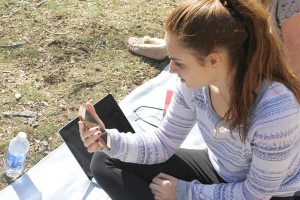
Alex Brostoff, ’19, sits in the Lower Centennial quad checking her social media pages on her phone on Sunday, Feb. 28, 2016. Professor Janey Lee conducted research on whether or not social media can change your mind. (Madi Welker/B&W Staff)
People perceive reality as it is described and shown on social media. Individuals receive the majority of news content through various social media platforms, according to Janey Lee, assistant professor in Lehigh’s department of journalism and communication.
Lee, who studied communications with a specialty in computer-mediated communications, recently published research about social media and political involvement. She focuses her research on young people’s perception of political communication on social media. She believes social media is an expanding and evolving outlet where young people are exposed to new information that they are not necessarily seeking.
Lee used a publicly available data set from Pew Research Center to conduct her research about questions surrounding the topic of article content and if one responds to various comments on social media.
“Social media use itself can lead to political view change,” Lee said. “I looked at both social media leading to political view change more political issue involvement on social media. I tested if these are possible.”
Lee said there are other factors that spark political view change, too, such as who posted an article or how many people liked or shared it. She wanted to test how these affected people’s understanding of news content.
After proposing a diagram of her hypothesis of the effects of social media, Lee gathered the results of her data and created a new diagram.
“Just exposure is not strong enough, but discussion is important and information seeking motivation is important,” Lee said. “If you use social media just for entertainment use, you lack the motivation.”
Lee said people need to have a desire to change their views, and content online is not enough to change their opinions.
“What’s important, what’s crucial, is actually getting involved in discussion,” Lee said.

Emma Fitzsimmons, ’19, walking through the Lower Centennial quad checking her social media pages on her phone on Sunday, Feb. 28, 2016. Professor Janey Lee conducted research on whether or not social media can change your mind. (Madi Welker/B&W Staff)
If someone seeks information with the goal of learning and possibly forming a view on a topic, involvement in the discussion is necessary. Some people, regardless of the information on social media, will not change their opinions, in part because they have similarly minded friends on social media platforms who hold the same view as them. This confirmation bias can prevent some people from seeing all sides of an issue.
“Usually I would ignore a political article unless the caption seems appealing to me,” Emily Reynolds, ’19, said. “It’s almost like the things that I do actually read are already things I believe.”
Reynolds said she sometimes reads articles that differ from her opinion to see what the writer has to say, but those articles don’t usually change her opinion.
Will Elliot, ’18, said he does not get involved in discussions on social media, and he prefers to talk to people in person.
“What I think is interesting in politics today is that a lot of social media is pro-Bernie Sanders, but is very anti-Hillary Clinton,” Elliot said about his social media timelines. “She’s made out to be a terrible person, and it ends up being a long chain of people saying the same thing over and over again with no backbone. It’s kind of cowardly, and I don’t take it seriously.”
Rachel Fishman, ’18, said she does not actively search for articles on social media, and she only reads articles to stay up to date.
“I sometimes click on articles because I think, at Lehigh especially, we’re in a bubble from the outside world and sometimes those articles keep you up to date on current events and other stuff, so I think they’re good,” Fishman said.
Although Lee said those who are looking to discuss political issues via social media may not change their views, they’re more informed and have better reasoning for their opinion than they did before reading the article. As long as people understand each other, differing opinions are not a problem, Lee said.
Lee hopes social media will spark more involvement and active participation in the future, which would be beneficial for democracy and society at large. Lee said more involved citizens with better-informed views are stronger participants in a society.





Comment policy
Comments posted to The Brown and White website are reviewed by a moderator before being approved. Incendiary speech or harassing language, including comments targeted at individuals, may be deemed unacceptable and not published. Spam and other soliciting will also be declined.
The Brown and White also reserves the right to not publish entirely anonymous comments.